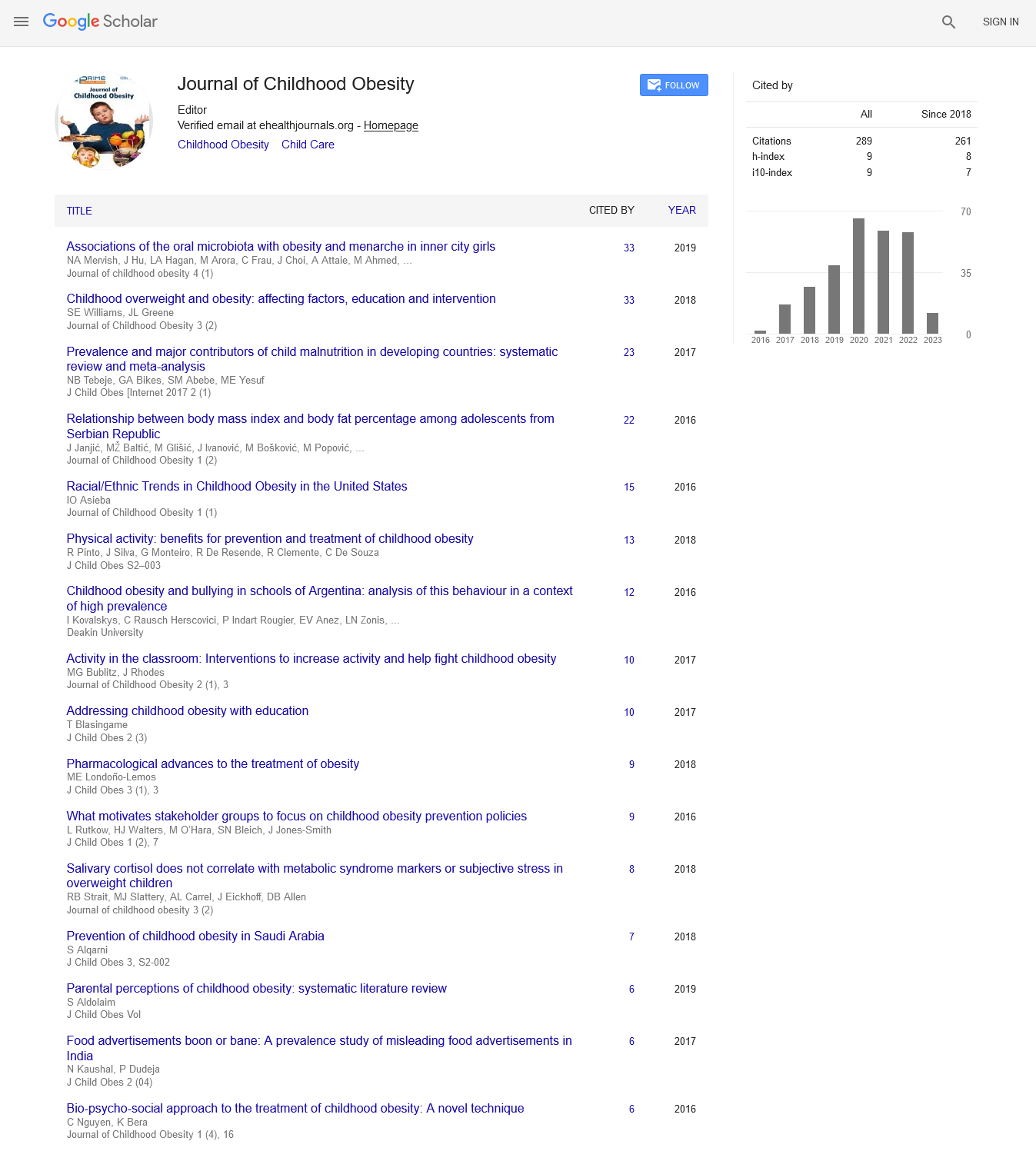Short Communication - (2024) Volume 9, Issue 6
Tackling Pediatric Obesity: Strategies for Prevention and Intervention
Andrew Parker*
Department of Pediatrics, University of California, United States
*Correspondence:
Andrew Parker,
Department of Pediatrics, University of California,
United States,
Email:
Received: 02-Dec-2024, Manuscript No. IPJCO-25-22534 ;
Editor assigned: 04-Dec-2024, Pre QC No. IPJCO-25-22534 (PQ);
Reviewed: 18-Dec-2024, QC No. IPJCO-25-22534 ;
Revised: 23-Dec-2024, Manuscript No. IPJCO-25-22534 (R);
Published:
30-Dec-2024, DOI: 10. 21767/2572-5394-9.6.31
Introduction
Pediatric obesity has emerged as a significant public health
concern worldwide. With the rise in unhealthy eating habits,
sedentary lifestyles, and genetic predispositions, the prevalence
of obesity among children has increased dramatically.
According to the World Health Organization (WHO), childhood
obesity is one of the most serious global health challenges of
the 21st century. It can lead to long-term health complications,
including diabetes, cardiovascular diseases, and psychological
issues. Addressing pediatric obesity requires a multi-faceted
approach, including dietary modifications, physical activity,
behavioral changes, and government policies. This article
delves into the causes, consequences, and solutions for
pediatric obesity. One of the primary contributors to childhood
obesity is poor nutrition. The consumption of processed foods
high in sugar, fat, and calories has significantly increased
over the years. Fast food, sugary beverages, and snacks
have replaced home-cooked, balanced meals, leading to
excessive caloric intake. Additionally, portion sizes have grown
substantially, contributing to overeating and weight gain.
The rise in technology has led to an increase in screen time,
including television, video games, and mobile devices. Many
children spend hours engaging in passive activities rather
than participating in physical exercises. Reduced outdoor play,
limited participation in sports, and a decrease in school-based
physical education programs further contribute to obesity
[1,2].
Description
Genetics can play a role in a childâ??s likelihood of becoming obese.
If one or both parents are overweight, the child is at a higher
risk of obesity due to inherited traits that affect metabolism and
fat storage. Additionally, environmental factors such as a lack
of access to healthy foods, socioeconomic status, and parental
modeling of eating behaviors can influence a childâ??s weight.
Children facing emotional distress, anxiety, or depression
may resort to overeating as a coping mechanism. Stressful
family environments, bullying, and low self-esteem can also
contribute to unhealthy eating behaviors. Emotional eating,
combined with a lack of physical activity, increases the risk of
obesity. Certain hormonal disorders, such as hypothyroidism
and Cushingâ??s syndrome, can contribute to excessive weight
gain in children. Additionally, some medications prescribed
for psychiatric or medical conditions may lead to increased
appetite and weight gain. Obese children are at a higher risk of
developing numerous health problems, including high levels of
glucose and insulin resistance can lead to diabetes at an early
age. Elevated blood pressure, cholesterol levels, and heart
disease risks are prevalent among obese children. Conditions
such as asthma and sleep apnea are more common in
overweight children. Excess weight can put a strain on growing
bones and joints, leading to pain and movement difficulties
[3,4].
Conclusion
Obese children are more likely to suffer from acid reflux, fatty
liver disease, and gallstones. Obesity does not only affect
physical health but also impacts mental well-being. Many
obese children face bullying and social stigma, leading to low
self-esteem, depression, and anxiety. They may struggle with
body image issues and social isolation, further exacerbating
emotional distress. Studies suggest that obesity can impact
cognitive functions and academic performance. Children who
are overweight may experience reduced concentration levels,
decreased memory retention, and overall lower academic
achievement due to the physiological effects of obesity on
brain function. Parents and caregivers play a crucial role in
shaping a childâ??s dietary habits.
Acknowledgement
None.
Conflict Of Interest
The author declares there is no conflict of interest.
References
- Anziano RJ, Milligan PA (2021) Model informed drug development: Collaboration through a common framework. Clin Pharmacol Ther. 110(5):1165-1167.
[Crossref] [Google Scholar] [PubMed]
- Zvirblis P, Ellin RI (1976) Acute systemic toxicity of pure dimercaprol and trimercaptopropane. Toxicol Appl Pharmacol. 36(2):297-9.
[Crossref] [Google Scholar] [PubMed]
- Zhu H (2020) Big data and Artificial Intelligence modeling for drug discovery. Annu Rev Pharmacol Toxicol. 60:573-589.
[Crossref] [Google Scholar] [PubMed]
- Schmidt EW, Lin Z (2022) Translating marine symbioses toward drug development. mBio. 13(6):e0249922.
[Crossref] [Google Scholar] [PubMed]
Citation: Parker A (2024) Tackling Pediatric Obesity: Strategies for Prevention and Intervention. J Child Obesity. 9:31.
Copyright: © 2024 Parker A. This is an open-access article distributed under the terms of the Creative Commons Attribution License, which permits unrestricted use, distribution, and reproduction in any medium, provided the original author and source are credited.

